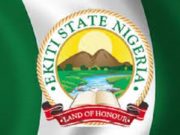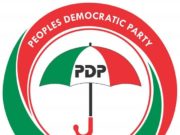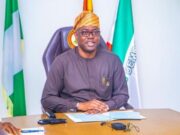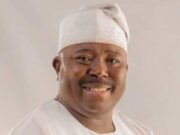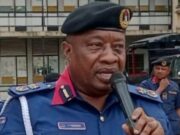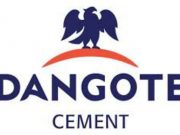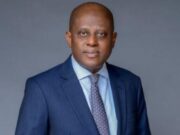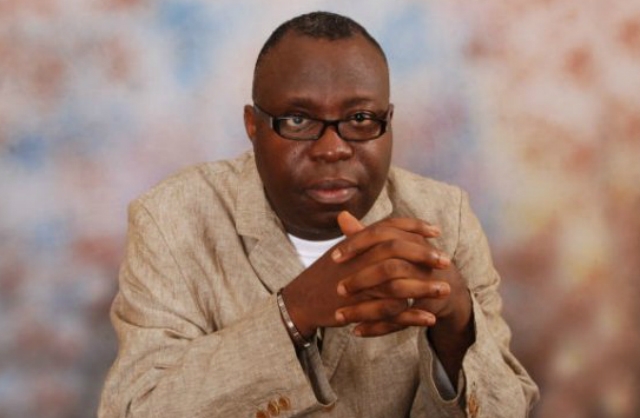In 2015, Senator Soji Akanbi, won the election to represent Oyo South Senatorial district, in the eighth Senate. For the people of the district and the entire Oyo state, the choice of the Okanlomo of Ibadan in the senate, turned out to be a royal blessing by virtue of the robust contributions that Senator Akanbi made on the floor of the House and even beyond the four walls of the National Assembly.
Akanbi came to the Senate well prepared. With a degree from Kingston University and an overwhelming experience in business from the aviation and financial sectors of the economy, working with diverse minds and people from different parts Nigeria and outside Nigeria.
Senator Rilwan Adesoji Akanbi had served under the administration of Alhaji Lamidi Adesina between 1999 and 2003; he was the Special Adviser on economic and industrial matters, when Oyo state had only three Special Advisers.
He was the Chairman of the committee on special projects, Chairman, poverty eradication project (LAMARP), Chairman, Oyo state Lottery Board, the Executive Chairman, Oyo state planning Commission and was a member of the House of Representatives in 1991.
He could feel the pulse of the people from Oyo state, viz a viz the pulse of people from other parts of Nigeria. Having travelled far and wide with his party the APC during the electioneering campaigns across Nigeria, Akanbi had made up his mind to tackle the issues that affects the common man on the street and even the elites. To him, every Nigerian is one and must enjoy all the benefits of being a Nigerian, together.
So, it was not out of place, when as a full-fledged senator in the eighth senate, Akanbi stood his ground and advised and insisted that President Muhammadu Buhari should not sell off National assets.
Rilwan Akanbi who represented Oyo South Senatorial district cautioned President Muhammadu Buhari against selling national assets to help the country out of recession.
It would be recalled that, Nigerian billionaire, and Africa’s richest man, Aliko Dangote, suggested then that it made more economic sense to sell off the country’s asset like the multi-billion dollar Nigeria Liquefied Natural Gas Limited, and the Nigeria National Petroleum Corporation Joint Ventures, and use the proceeds to help the economy out of recession.
Unfortunately then also, the proposal was backed by Senate President Bukola Saraki and the National Economic Council which comprises state governors, the Vice President as the Chairman, Central Bank Governor, Finance Minister and others.
But many Nigerians rose against the plan. Mr. Akanbi it could be recalled stood his ground and that the asset may be undervalued if sold at desperate times.
“The assets will end up with the capitalists who actually don’t have the resources. They will then run to banks to take deposits of ordinary Nigerians to buy assets which originally belong to them, the ordinary Nigerians. So what you have eventually is a situation where Nigerians are exploited through banks and also dispossessed of publicly owned assets.
“Apart from the economic dimension, national assets are instruments of unity in a country that is plural like ours. Yoruba, Ibo, Hausa, Ijaw and all other groups have the consciousness that national investments unite us and that gains or otherwise therefrom are nationally shared,” the Senator said.
The senator added then “that privatisation in Nigeria has been “a big failure because it has always been a process of letting few persons who lack the required wherewithal – but are well positioned and have access to power and money deposited by Nigerians – benefit from artificial misery or crisis in various sectors. We must not take that route again.”
He said there were “other ways” through which the government could raise money and bring the country out of recession.
One alternative, according to Mr. Akanbi, is to give special support to SMEs and others in the micro economy through access to low-interest loans.
He also urged greater investment in agriculture.
“We need the state of Nigeria to lead the development process by deliberately linking agriculture with industrialization and support farmers so that we can attain self-reliance in food production. Spending billions of dollars on food importation is not sustainable; we must therefore produce what we eat by ensuring crops are not just brought out of the ground but also converted to food.”
Mr. Akanbi said, “it is now imperative for all public office holders across the organs of government to make sacrifice and be set for pay cut. We must reduce cost of governance and cut wastes so that the government can have money to work for the people and the development of the country”.
He also urged state governments to implement terms of the Fiscal Sustainability Plan designed for them by the federal government, saying that “improved governance that is people and development-focused at sub-national levels is crucial for a lasting solution to our democracy.
Senator Adesoji Akanbi also made National impact in the 8th senate in the area of health., when he clarified what the National Health Act means.
“It simply mears respect for the rule of law,” he said.
On October 27,2014 the National Health Act (NHA, 2014) was officially gazetted having extensively gone through the legislative processes of the Lower and Upper Chambers of the National Assembly and assented to by the President of the Federal Republic of Nigeria. The NHA 2014 became a law of the Federal Republic of Nigeria. Without going through all that the National Health Bill went through before becoming a law, it was a collective agreement of the Nigerian people across different ethnic, religious and professional groups, it was the guiding principles the people collectively agreed to be governed by and have gone through the established process of becoming a law of the land. By virtue of the constitution of the Federal Republic of Nigeria, the National Assembly has equal power with the other two arms of government. Each, with its own responsibility, has been established to secure and protect democracy and the guiding principles of democracy, which is respect for the rule of law. Theirs being particularly the making, repealing and amending of laws lends credence to the fact that whatever the law says must be respected and be abided by.
Part 1, Section 11 (2a) states: “The Basic Health Care Provision Fund shall be financed from (a) Federal Government Annual Grant of not less than one per cent of its (Consolidated Revenue Fund (CRF).”
This requirement is similar to the compulsory Universal Basic Education Act 2004 otherwise known as Universal Basic Education (UBE) fund that requires two per cent of the CRF to be dedicated for funding basic education. While the UBE fund, signed into law in 2004, became effective and implemented in 2005, the National Health Act 2014 is in four budget cycles and is yet to see the light of the day.
The Federal Government of Nigeria has successfully gone through three budgeting cycles (year 2014, 2015 and 2016) and is in the fourth one now being year 2017 budget, and still the National Health Act 2014, a law of the Federal Republic of Nigeria, is not featuring in the 2017 proposed budget of Nigeria.
What does this mean for our democracy and the people of Nigeria? The implication is far-reaching for our democracy. The unintended message the government would be communicating to Nigerians is that the law is selective and ineffective, and how powerless the people are in continuing to participate in a democratic system of government that lends its voice to collective agreement, but currently, that voice is being silenced by the government.
This portends a great danger to our democracy which is protected by law as agreed by the collective and majority of Nigerians. It is an outright disregard of the law that was demanded by the good people of Nigeria for their health and well being, painstakingly legislated upon by the National Assembly and assented by a president of the Federal Republic of Nigeria. As a legislator, it amounts to a sheer waste of legislative time and the confidence of Nigerian people in their representatives. If this persists, the people of Nigeria would misinterpret this as a disregard for an arm of government and that impression must be corrected immediately.
Senator Adesoji Akanbi during the eighth senate, also carved a niche for himself and the country in the area of the issue of Lagos-Calabar Rail Project that was arbitrary removed in the budget, in which Senator Akanbi went publicly asking President Muhammadu Buhari not to sign the budget until the project removed should be included back in the Appropriation act.
It could be recalled that President Muhammadu Buhari yielded to the call of people like Senator Rilwan Adesoji and refused to sign the budget until the project was finally included.
As at today the Federal Government, CCECC sign agreement to build 11.12bn dollars Lagos -Calabar railway route, project expected to be delivered.
Akanbi had argued that since the project needed external funding, it should not be made to wait for any supplementary budget. “If I were President Buhari, I would not sign the budget because of that rail project,” Mr. Akanbi said.“It is a very important project. The project and that of Lagos- Kano are parts of things for which the President is seeking funding in China. The N60 billion sought for the project is just our counterpart funding. “So, since the project involves external funding, it is time-bound and cannot wait for supplementary budget. Otherwise, we will be seen as unserious people to foreign supporter, China in this case. “When the President returns from China, what I expect is that he should return the budget to us (National Assembly) with formal request for inclusion of the project and to any other issues. Amending budget should not take more than one week,” Mr. Akanbi said. He noted that the Senate Committee on Land Transport chaired by Gbenga Ashafa included the project in its report after Transport Minister, Rotimi Amaechi, sent his ministry’s supplementary proposal but regretted that the appropriations committee removed the project. “They (Appropriations Committee arrogated too much power to themselves. Why should they remove a project without respect for the concerned committee? Fine! It was omitted earlier but the Minister later brought it and the concerned committee approved the project. They should nothave removed and included projects not even proposed at all without even feasibility reports.“So, the President should return the project.
That exactly was Senator Akanbi’s summation and thank God that President Muhammadu Buhari agreed to his advice.
- Paul Ukpabio sent this in from Lagos


















